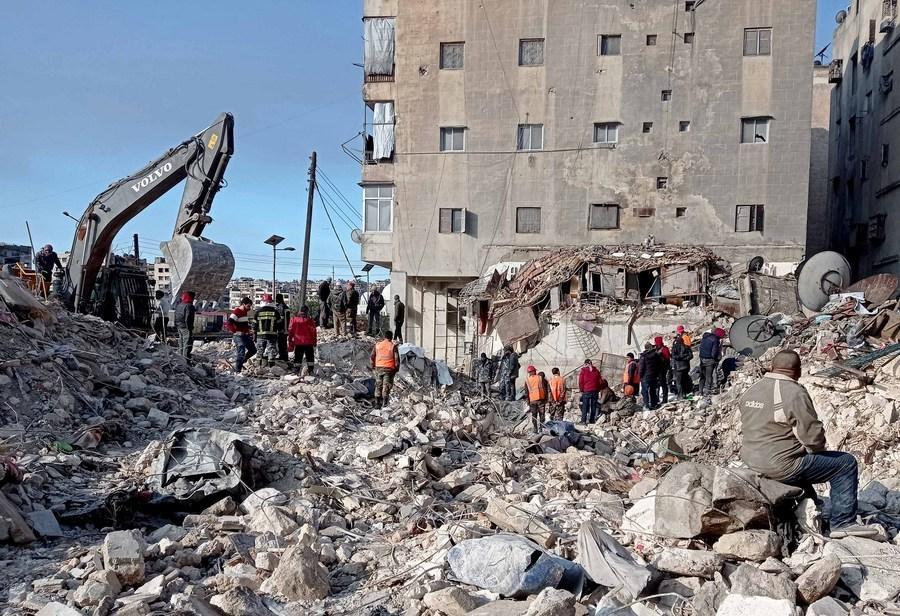
A destroyed building is seen at the Al-Qatirji industrial city in Syria's northern city of Aleppo, March 7, 2022. [Photo/Xinhua]
By Christopher Helali
The devastating earthquake that hit Türkiye and Syria on February 6 has killed over 34,000 people and cost billions of dollars' worth of damage. In Syria, the earthquake has exacerbated an existing humanitarian crisis caused by a decade-long civil war coupled with brutal U.S. and EU sanctions that target the civilian population.
Given the destruction that the earthquake caused, numerous world leaders called for the lift of economic sanctions on Syria. Humanitarian relief has arrived from nations around the world including China, Russia, Iran, Belarus, Venezuela, and Cuba. Teams have also arrived from various countries to help with search and rescue missions, along with repairing infrastructure, as well as delivering medical aid and humanitarian relief.
However, ongoing U.S. and EU sanctions continue to punish Syrians, causing shortages of food, medical supplies, and basic necessities. UN Special Rapporteur Alena Douhan recently visited Syria where she reported that 90 percent of Syria's population lives below the poverty line. Limited access to food, water, electricity, adequate housing, fuel, and medical supplies are a direct result of the ongoing sanctions.
Douhan's visit to Syria prompted her to call for the "immediate lifting of all unilateral sanctions" that violate human rights. This was also echoed by Shi Hongwei, China's Ambassador to Syria.
The U.S. Treasury said it has authorized exemptions for humanitarian aid related to earthquake relief for 180 days. Everything else was still prohibited by the Syrian Sanctions Regulations.

People search for survivors among the rubble of a building destroyed in a powerful earthquake in the al-Masharqa neighborhood of Aleppo city, northern Syria, February 7, 2023. [Photo/Xinhua]
The U.S. sanctions on Syria include the Cesar Act, which punishes individuals and groups that provide aid to Syria to help with reconstruction efforts that are government led. Nevertheless, aid is exempted for rebel held areas including Idlib, a province controlled by Al-Qaeda affiliates.
This hollow maneuver by the United States was chastised by Syrian President Bashar al-Assad who called the West's so-called humanitarian position hypocritical. The West has done little to provide relief while continuing on with the occupation of sovereign Syrian territory.
The United States and its allies in the region maintain a military presence, occupying Syrian territory and plundering Syria's oil wealth. Who can forget former U.S. President Donald Trump's tweet that openly praised the fact that U.S. troops were in Syria for the oil.
Consequently, Syria continues to be marginalized when it comes to international aid, especially energy, which is severely limited due to the sanctions. This will lead to a greater humanitarian crisis.
While the U.S. and EU are under enormous pressure to end their sanctions on Syria, this is unlikely to happen. The reasons include the ongoing attempt to end Assad's rule in Syria, control of Syria's natural resources, control of parts of Syria's borders, and the balkanization of the country into different regions controlled by different factions, which are backed by the U.S.-EU-NATO alliance.
There's no doubt the U.S. and EU sanctions are egregious and a gross violation of international human rights expectations. If Syria hopes to recover and rebuild after over a decade of civil war and a destructive earthquake, the sanctions on the government must end.
Christopher Helali is the international secretary of the Party of Communists USA and a PhD candidate in philosophy and China Government Scholar for Sino-U.S. Cultural Communication at Tongji University.

 中文
中文



